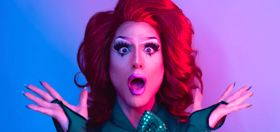
History–or in this case, alternate history–marches on, at least on HBO. The network’s acclaimed series Watchmen just had a watershed moment through the introduction of Hooded Justice/Will Reeves, an openly gay African American superhero.
For the uninformed, Watchmen follows the moral quandaries of an alternate timeline, one in which superheroes emerged in real life in the 1930s and 40s. Rather than having a positive effect on society, however, their existence wreaked havoc on the world, especially after the creation of the God-like being Dr. Manhattan. By 2019, the Tulsa, Oklahoma police department consists entirely of costumed officers, including Sister Night (played by Regina King) who stumbles onto another sinister plot involving Dr. Manhattan, a conspiracy of silence, and an alt-right militia group.
Related: WATCH: HBO drops the first ‘Watchmen’ trailer, and teases a new kind of queer superhero
Sunday’s episode, titled “This Extraordinary Being,” (spoiler alert!) explores the history of Sister Night’s grandfather, revealed to be the first African-American police officer in Tulsa, Will Reeves (played by Jovan Adepo). Persecuted by his fellow officers and the Tulsa community, he dons the costumed identity Hooded Justice, avenging crime around the city. Hooded Justice also attracts the interest of another costumed hero, Captain Metropolis (Jake McDorman). When the two meet, they begin a torrid affair…and the show makes its first major misstep.
How about we take this to the next level?
Our newsletter is like a refreshing cocktail (or mocktail) of LGBTQ+ entertainment and pop culture, served up with a side of eye-candy.
We should mention here that the identity and backstory of Hooded Justice deviate from that of the source novel, written by Alan Moore and Dave Gibbons. In the original text, the Hooded Justice-Captain Metropolis relationship is one of the bright spots in a gritty, lonely story. Theirs is a pure love affair, and the subsequent murder of Hooded Justice sends Captain Metropolis into a downward spiral. He begins to abuse alcohol, has a nervous breakdown, and ends up institutionalized.
The alteration of the Hooded Justice identity into that of Will Reeves fits well with the TV series Watchmen‘s meditations on racism in the United States, and the show also deserves applause for having the chutzpah to explore a same-sex superhero relationship. That said, making what was a loving relationship in the source material into a fetishized, coercive one is not the best way to introduce a groundbreaking, African-American gay superhero. The TV series portrays Captain Metropolis as someone who isn’t devoted to fighting crime so much as a gay man into costumed roleplay. Furthermore, his treatment of Hooded Justice doesn’t just devalue their relationship, it makes it downright abusive.
Watchmen deserves credit for addressing issues of racism, and for integrating a terrific character like Will Reeves into its story. But the show also falls back on the trope of hypersexualized, sociopathic queer characters–the kind that functioned as villains for decades in film and television. Call it provocative, call it timely, call it powerful…but don’t call it progress.


















chupacabra
ive got your hooded justice hanging….
maleficent
love it!
PLAYS WELL WITH OTHERS
Blacks really haven’t had a great history with hoods…..
chupacabra
lots of AA living quite well in my hood.
oh yeah, you’re an ignorant fool… a reason …not an excuse.
Cato
Given the time and place of the interracial relationship between Captain Metropolis and Hooded Justice in the late 1930s-early 40s, the problems in the relationship are understandable. Much more realistic than the pure and untainted fantasy in the original comic. They can love each other deeply and still have issues with race, unequal power, and even abuse in the relationship.
One minor correction — Will Reeves is not the first black cop on the Tulsa force. When he’s being sworn in, an older black officer shakes his hand and warns him about Cyclops.
truthseeker
Reminds me of Jussie Smollet from the picture
DanTaylor
Hi, Craig. How’s it going? I hope you have time to read this, but you are probably too busy making up conspiracy theories on Madonna’s tour. Get a life, dude. There is a reason so many people hate you.